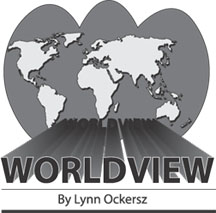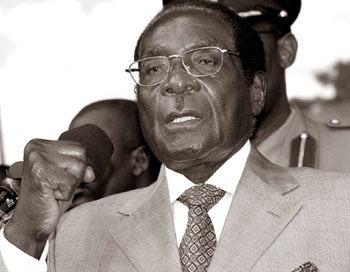Zimbabwe withers in Mugabe's mailed fist

|

Zimbabwean President Robert Mugabe addresses party supporters at his
head office in Harare, in this file photo taken Friday, March 30,
2007. University of Massachusetts officials are reviewing plans to
rescind an honourary doctorate of law degree bestowed upon Mugabe in
1986 when he was hailed as a humane revolutionary who ended an
oppressive white rule to establish an independent Zimbabwe in 1979.
But in the two decades since, Mugabe has been condemned for attacks
on dissidents and accused of running a corrupt government that has
ruined the economy. AP
|
The increasingly bloody political repression in Zimbabwe is proof of
the growing desperation of its ageing authoritarian ruler - President
Robert Mugabe.
Contemporary Zimbabwe provides clinching evidence that strong arm
rule and a growing panic over losing power among those capriciously
wielding it, are just two sides of the same coin. Mugabe is right now a
living example of this pervasive political tendency.
There is a growing wave of popular opposition to Mugabe's rule but
the reaction of the out-of-favour authoritarian Head of State is to
unleash all the repression at his command on the dissenters. Thus has
the Movement for Democratic Change (MDC) led by Morgan Tsvangirai been
subjected to severe physical harassment and demoralizing restrictions.
Tsvangirai himself has been a victim of the state's strong arm tactics.
The severity of the repression that has been thus exercised is
strongly reflective of the state's determination to thwart the gathering
movement for political liberalization in Zimbabwe.
Substantial democratic change in the country continues to be an
elusive goal. However, rather than take the zest out of the opposition
campaign, the mounting repression only seems to be making it grow.
With the Catholic Church in Zimbabwe coming out strongly in favour of
the movement for democratic change, the opposition to the state seems to
be acquiring unprecedented depth and vibrancy.
In a letter titled "God Hears the Cries of the Oppressed", the
Catholic Bishops Conference of Zimbabwe said, among other things, that,
"Many people in Zimbabwe are angry and their anger is now erupting into
open revolt in one township after another ..... In order to avoid
further bloodshed and avert a mass uprising, the nation needs a new
people-driven constitution that will guide a democratic leadership
chosen in free and fair elections".
With the Catholic Church taking on a pivotal role in the opposition
to Mugabe's rule, the confrontation between the sides could be expected
to be both prolonged and absorbing, with the opposition receiving
increasing strength and staying power.
In a Catholic-majority country, the Church is bound to make much
headway as an awareness-raising agent.While a weakening of the
government could not be expected in the short and medium terms, it is
bound to suffer impairment in the long term as the opposition campaign
gains strength and Zimbabwe faces international isolation as a result of
the West taking strong exception to the Zimbabwean state's repressive
conduct.
Moreover, the deteriorating economic situation in Zimbabwe too is
bound to further spike opposition to the state. Today, agricultural
productivity in the country has hit rock bottom and the inflation rate
is rising astronomically. Even if political disaffection does not have
the desired effect of weakening the state, economic disaffection would.
With the majority of the population living off state handouts,
economic discontent is likely to take a heavy toll on the country's
internal stability. Although initially described by the Western press in
the early eighties as "Marxist leaning", Mugabe is no communist.
His initial policy platform was black nationalism and this did serve
the vital purpose of delivering Zimbabwe from white minority rule.
However, unlike in the case of South Africa, Mugabe has failed to
take his country along even a broadly social-democratic path. Zimbabwe
has had no guiding vision of this kind and has today degenerated into an
authoritarian, one-party state where the state class or the ruling elite
is enjoying an obscenely parasitic existence, while the people wither
and die in a state of chronic economic want.
The fate that awaits such states is a prolonged, agonising, slow
death. The often noted Third World political irony of the one-time
oppressed degenerating into the oppressor, is thus haunting Zimbabwe
too.
The Zanu-PF under Mugabe and their allies did well to dislodge the
white minority regime under Ian Smith in 1980 but have failed to take
Zimbabwe along a progressive path. Instead the erstwhile liberators have
today turned oppressor. That is, the new, black state class is
entrenching itself in power at the expense of the people.
One could only hope that the movement for democracy would have long
life and resourcefulness because it is an important corrective to the
oppressive structure forced on Zimbabwe by its one-time liberators.
[email protected]
|
